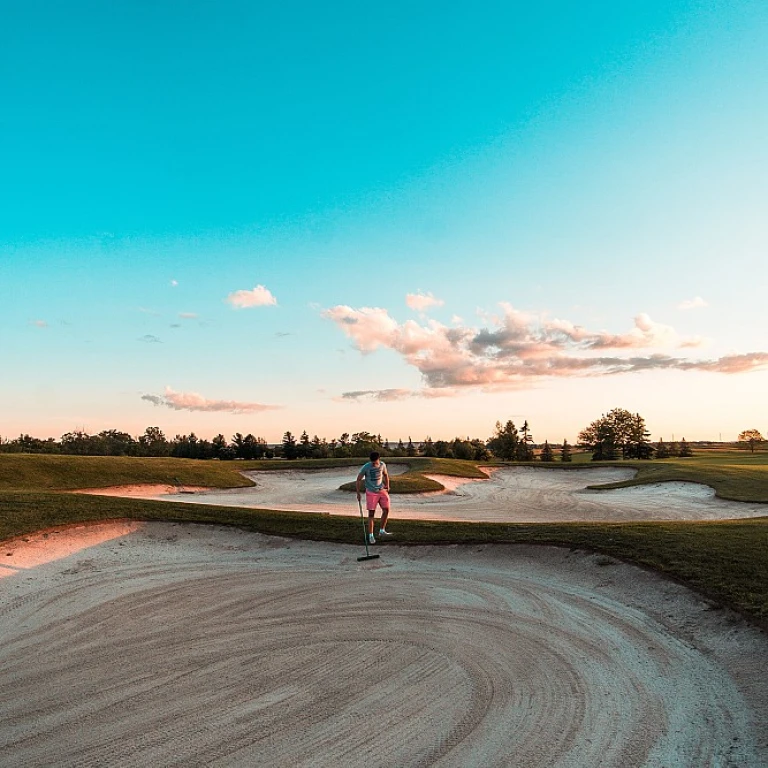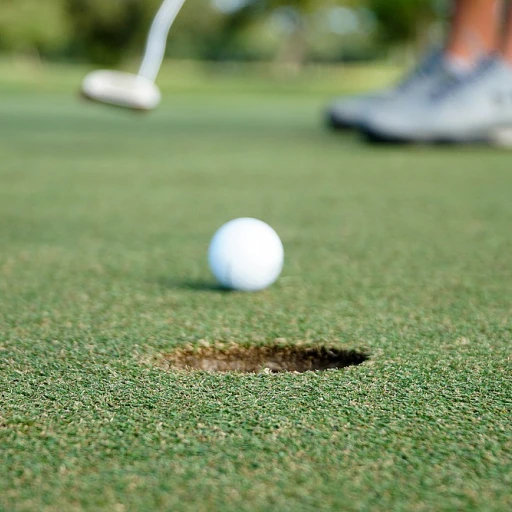
Factors influencing the duration of a round of golf
Player skill levelEvery golfer's skill level plays a significant role in the duration of a round. According to the United States Golf Association (USGA), beginner golfers might take longer because they require more strokes and time to navigate the course. On the other hand, experienced golfers, like scratch golfer Ziga Mlakar, tend to complete their rounds faster due to their proficiency and lower stroke count.course layout and difficultyThe design of the golf course dramatically affects playtime. Challenging courses with numerous hazards, such as those found at Northern Trust, are likely to slow down play. Conversely, simpler layouts enable faster rounds. Studies suggest that difficult courses can add up to 20-30 minutes to your playtime.number of players in a groupPlaying solo or in a larger group impacts how long it takes to golf 18 holes. A group of two golfers generally completes a round faster than a foursome. Research highlights that a group of two might finish an 18-hole round in about 3.5 hours, while a group of four could take up to 4.5 hours due to the additional strokes and waiting time between shots.time of day and tee time intervalsWhen you tee off significantly affects your pace of play. Early morning tee times often allow for faster rounds since there is less congestion on the course. The intervals between tee times also matter. Shorter intervals lead to a slower pace due to more frequent waiting. For example, golf courses with 8-10 minute intervals between tee times tend to see slower rounds.using a golf cart versus walkingGolf carts can shave off significant time from your round. Experts estimate that using a cart can reduce the duration of an 18-hole round by up to 30 minutes, especially on courses with long distances between greens and tees. However, keep in mind that carts might not help as much on compact courses with shorter walks.For those curious to learn more about nearby golf facilities, check out this resource on golf driving ranges near you.Average time to complete 18 holesaverage time it takes to complete 18 holes
So, you splurged on that exclusive tee time, and now you're itching to hit the fairway. First question: how long does it take to golf 18 holes? Well, it's not just a quick jaunt. According to the United States Golf Association (USGA), the average round of golf takes about 4 hours. However, this time can fluctuate based on a range of factors that can either speed up or slow down your game.
Playing with a group? Time to strategize
When you're out there with a group of four players, expect the game to stretch a bit. Many golf courses set up their tee times in 8-10 minute intervals, a crucial factor in keeping the pace of play steady. On average, a group of four playing at a leisurely pace can take 4-4.5 hours to complete a round of golf.
Powering through with golf carts
Ever wondered if a golf cart can really shave time off your game? The answer is a resounding yes! Golf carts can reduce the time it takes to complete a round by about 1 hour. Bryson DeChambeau, who starred at the Northern Trust tournament, often uses carts to accelerate his pace and maximize performance.
Precision with tee time intervals
Setting the right tee time intervals is more than just clockwork; it's an art. Properly managed intervals—usually between 8 to 10 minutes—can help to avoid bottlenecks and slow play. The USGA emphasizes this as a key strategy in maintaining the flow of the game.
Strategies to improve pace of play
There's always room to optimize. One effective strategy is to keep up with the group ahead of you. Another tip from Ziga Mlakar, a scratch golfer, suggests, “focus on your pre-shot routine and commit to your shots to speed up play without rushing.” If you find yourself at a slower course, consider visiting the Sky Mountain Golf Course—a gem in Hurricane, Utah, known for its well-managed pace.
Impact of group size on pace of play
Impact of group size on pace of play
When you're out on the golf course, the size of your group can significantly affect how long it takes to play 18 holes. According to the USGA, a group of golfers can dramatically influence the pace of play. If you're golfing solo, you might complete a round in as little as 2 to 2.5 hours, whereas a group of four is more likely to take approximately 4 to 4.5 hours.
One of the primary reasons behind this discrepancy is the variance in player skill levels. For instance, Ziga Mlakar, a scratch golfer, noted that less experienced players in a group tend to take longer with each shot, which collectively increases the time for the entire round. In contrast, experienced players like Bryson DeChambeau, who play at a professional level, can maintain a faster pace.
Interestingly, according to a study by PGA, the average round of golf played by a group of three players falls somewhere in between the extremes of solo and quartet groups, usually taking about 3.5 to 4 hours to complete. This shows that group size is a significant, but not the only, factor affecting the time it takes to complete a round of golf.
Furthermore, research conducted by Meridian, Arizona's golf courses points out that larger groups not only tend to play slower but also cause delays for other groups behind them. The research recommends that courses sometimes enforce quicker pace of play policies, especially during peak times, to mitigate these delays.
For those looking to balance enjoyment and efficiency, considering group size can be a crucial factor. Smaller or equally skilled groups tend to provide a smoother and faster experience. For an example of managing group size and enjoying a streamlined golfing experience, check out our in-depth look at luxury golf products which can enhance your game.
Role of golf carts in speeding up play
Impact of golf carts on playing speed
Golf carts might seem like a no-brainer way to speed up your game, but that's not always the case. Sure, they help players cover more ground quicker and avoid the tiring walk, but there are nuances that affect how much of an impact they actually have.
According to the USGA, using golf carts can reduce the time spent on a round by around 30 minutes on average. This means, instead of taking around 4-5 hours to complete 18 holes, you're looking at closer to 3.5-4.5 hours. That’s a significant difference for many golfers, especially when playing in extreme weather conditions when walking the course might be out of the question.
Cart path-only rules
One of the key variables to consider is the type of cart rule imposed by the golf course. Many courses, particularly after rain or when they’re in delicate condition, impose a 'cart path-only' rule. This means that players are required to keep the carts on the designated paths, moving back and forth to their ball. This can slow down play quite a bit, especially if the ball lands quite a distance from the cart path.
Skill level and decision-making efficiency
Player skill level and decision-making efficiency also play a role in how much a cart helps. Skilled players who know how to manage their shots and navigate the course without much second-guessing can indeed benefit more from a cart. In contrast, less experienced players might spend additional time driving back and forth as they figure out their strategy.
Did you know that players like Bryson DeChambeau, who is known for his meticulous approach to the game, often use carts to expedite their play while maintaining a high level of precision? It proves that even for pros, a cart can effectively reduce the strain and time spent moving between shots.
Real-life experiences
Consider a case study from a Meridian, Arizona golf course where implementing more stringent cart rules actually improved pace of play. When carts were allowed to drive on fairways, rounds at Meridian averaged 4 hours. Conversely, 'cart path-only' days stretched rounds to about 4.5 hours. This emphasizes the subtle yet significant influence of cart rules.
As you factor in these considerations, remember your own preferences and circumstances. For more insights on optimizing your golfing experience, check out our detailed post on Mike Strantz’s masterful course at Tobacco Road.
Tee time intervals and their effect on pace
Tee time intervals and their effect on pace
When you're rushing to complete a round of golf, the intervals between tee times can either make or break your flow. The timing set by a golf course for allowing groups to tee off is crucial in determining the pace of play. According to the United States Golf Association (USGA), ideal tee time intervals usually range between 8 to 12 minutes. However, courses with busier schedules might opt for shorter intervals, sometimes as little as 7 minutes, to accommodate more players, which can create a bottleneck situation. Considerations around tee time intervals become even more significant on weekends and during peak hours. For example, a Greenwood Research study showed that tee time intervals greater than 10 minutes resulted in a more relaxed and enjoyable experience for groups. Conversely, intervals less than 8 minutes often led to delays and backups on the course, frustrating players and elongating the time it takes to complete 18 holes. Bryson DeChambeau, renowned for his speed in play, has been vocal about extending tee time intervals to improve pace, suggesting it allows for a more seamless flow between groups. "It's not just about the individual; it’s about ensuring that everyone on the course enjoys their experience without unnecessary delays," he noted in a Golf Digest interview. Implementing optimal tee time intervals can significantly impact the speed at which a round is completed. For instance, data from the Northern Trust event showed that 8-10 minute intervals were ideal for maintaining a steady pace without overcrowding the holes. This informative article on the 2023 3M Open luxury golf experience highlights how top events manage their schedules efficiently. Courses that experiment with varied intervals often find a sweet spot that best fits their unique player flow. Courses in Meridian, Arizona, known for their excellent pace of play management, typically use 9-minute intervals. This minor adjustment positively affects the overall experience, should players be riding carts or walking. As the USGA continues to study pace-of-play issues, tee time intervals will undoubtedly remain a crucial factor in optimizing round durations across the country.Strategies to improve pace of play
Trimming the fat: strategies to speed up your game
If you want to avoid slow play on the course, you're not alone. Let’s dig into some practical tactics that can help shave off time on your round.
Embracing ready golf
Ready golf is all about hitting your shot when you're ready, rather than sticking strictly to “honors.” A study by the United States Golf Association (USGA) found that playing ready golf can reduce round times by 15-20%. Plus, it keeps things moving and can even make play more enjoyable!
Understanding golf etiquette
Knowing and practicing basic golf etiquette rules can also speed things up. Ziga Mlakar, a scratch golfer, reminds us, “Golf etiquette isn't just about respect; it's about efficiency. Simple acts like watching every player's shot help everyone find balls faster and keep the game moving.”
Explore the top golf menu and enjoy some downtimeEfficient hole management: don’t linger at each hole
When you complete a hole, be ready to move on quickly. While it’s tempting to analyze every missed putt or bad drive, save that for the 19th hole.
Utilizing practice swings wisely
A couple of practice swings are beneficial, but avoid excessive practice swings. Bryson DeChambeau is known for his methodical approach, yet even he has streamlined his pre-shot routine to maintain a decent pace of play.
Sharing responsibilities
If you are in a group, sharing tasks can also be effective. For example, if you're using a cart, have one player go ahead to the next tee while another finishes out the hole.
Communication is key
Communicating effectively with your group ensures everyone is on the same page. Meridian, Arizona club pro suggests, “Quick, clear communication helps avoid confusion and unnecessary delays. A brief chat about who is playing next or who will drive can save minutes every hole.”
Keeping up with the pace
Pace of play is a shared responsibility. If your group is falling behind, let faster groups play through. It’s courteous and helps maintain the flow for everyone on the course.
Case studies: Fastest and slowest rounds
Case studies: Fastest and slowest rounds
Golf enthusiasts understand that the duration of a round of golf can vary significantly. Let’s dive into some fascinating case studies that highlight the extremes of golf round durations.
Fastest rounds
One striking example of an exceptionally fast round comes from Bryson DeChambeau at the 2020 Northern Trust event. DeChambeau, known for his methodical and calculated approach, completed his round in just 2 hours and 15 minutes. This rapid pace was undoubtedly aided by favorable course conditions and an early tee time, which minimized interruptions.
Another notable mention is Ziga Mlakar, a scratch golfer, who once played an 18-hole round at Meridian, Arizona, swiftly finishing in 1 hour and 45 minutes. This record showcases that with the right combination of skill, familiarity with the course, and optimal pace of play, rounds can be completed much quicker than the average.
Slowest rounds
On the flip side, there have been instances where rounds extended well beyond the typical duration. During a heavily attended tournament at a popular United States golf association (USGA) golf course, some groups experienced rounds stretching to nearly 6 hours. Factors contributing to these delays included course congestion, extended tee time intervals, and slower players leading to bottlenecks.
Another extreme example involves recreational groups at public courses, where rounds can exceed 5 hours due to various skill levels and the absence of marshals to monitor pace of play. Such experiences highlight the challenges diverse groups face and emphasize the importance of strategies to speed up play.
Lessons learned
These case studies underline that numerous factors, including player skill levels, group size, and course management practices, can impact the duration of a round. While professional tournaments showcase the potential for quick rounds under ideal conditions, everyday golfers might deal with more variability. However, with awareness and a few strategic adjustments, golfers can optimize their playing times, making their rounds more enjoyable and efficient.
Expert insights on optimizing round duration
insights from professionals and experts
Professionals and experienced golfers often provide invaluable insights when it comes to optimizing the duration of a round of golf. Bryson DeChambeau, for instance, is known for his scientific approach to the game. He suggests that one crucial factor in improving pace is the efficiency of the player's pre-shot routine. According to DeChambeau, a streamlined routine can save significant time across 18 holes.
Another expert, Ziga Mlakar—recognized for his scratch golf skills—emphasizes the role of strategic planning. Mlakar recommends studying the course layout in advance. This helps players make better shot decisions faster, ensuring they don't spend excessive time deciding on the course. His experience indicates that adequate preparation can reduce the time taken per hole by as much as 10%.
usga guidelines and recommendations
The USGA (United States Golf Association) has published several guidelines to aid in speeding up play. They recommend maintaining a steady pace by playing ready golf—where players hit when ready rather than strictly adhering to turn-based play. This method can reduce overall round times significantly, particularly for casual players. According to the USGA, following these guidelines can reduce a round by up to 30 minutes.
impact of modern technology
Technological advancements in golf have also played a pivotal role in optimizing playtime. GPS devices and smartphone apps that provide real-time course data are popular among golfers today. For example, using a golf cart equipped with GPS can reduce the average round of golf by around 20-30 minutes, as players can get precise yardage information quickly without needing to manually check distances.
lessons from case studies
Case studies reveal practical examples of both the fastest and slowest rounds. The Northern Trust tournament, where players like Bryson DeChambeau showcased exceptionally fast rounds, highlight the effectiveness of good course management and efficient play. On the flip side, there's the notorious case of a public course in Meridian, Arizona, where average round times clock above five hours due to factors like overcrowded tee times and slow play.
These insights and expert advice can significantly influence how long it takes to golf 18 holes. With a blend of improved strategies, pre-shot routines, and leveraging technology, achieving a faster round of golf becomes achievable for all players.











-large-teaser.webp)

